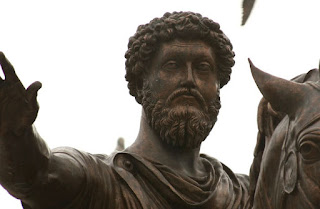Stoicism Doesn’t Mean Emotionless
Many people think Stoicism is merely a synonym for "emotionless" or, at most, a dusty ancient-Greek philosophy.
While, yes, Stoicism originated with such ancient illuminati as Seneca, Epictetus, and Marcus Aurelius, it's far beyond “emotionless.”
And Stoicism is more widely adopted today than one might think: from the New England Patriots and Seattle Seahawks staff to rapper LL Cool J and broadcaster Michele Tafoya.
Plus, Stoicism's devotees have included George Washington, Walt Whitman, Frederick the Great, Eugene Delacroix, Adam Smith, Immanuel Kant, Thomas Jefferson, Theodore Roosevelt, and Ralph Waldo Emerson.
What is Stoicism? It asks us to do good while staying calm, to focus on what’s important and under our control, not wasting thoughts let alone time on what we can't affect.
Easier said than done, especially with all the modern pressures that beset even successful people. To help, Ryan Holiday and Stephen Hanselman have written the just-published book, The Daily Stoic: 366 Meditations on Wisdom, Perseverance, and the Art of Living.
For each day of the year, this attractive book (complete with ribbon bookmark) offers a quotation from a top Stoic followed by Holiday’s commentary to elucidate its relevance to us today.
Here are some nuggets I've extracted from the book:
What to prioritize
Addicts cannot change the abuse suffered in childhood. They cannot undo they choices they have made or the hurt they have caused. But they can change the future—through the power they have in the present moment.
We prioritize and extol things that people have almost no control over—high cheekbones, complexion, height, piercing eyes. Is it really beautiful to win the genetic lottery? Or should beauty be contingent on the choices, actions, and attributes we develop: an even keel, a sense of justice, a commitment to duty?
Personal growth
Listen and connect with people; don’t perform for them.
Precariously, we don’t feel good about our accomplishments or talents until some third party validates them.
College students claim to want to be taught but really secretly believe they already know everything.
If anyone can show me that I think and act in error, I will gladly change it—for I seek the truth, by which no one has ever been harmed. The one who is harmed abides in self-deception and ignorance. (Marcus Aurelius)
People seek retreats for themselves in the country, by the sea, or in the mountains ... But this is entirely the trait of a base person, when you can, at any moment, find such a retreat in yourself. (Marcus Aurelius)
At the end of each day, Seneca would ask himself, "What bad habit did I curb today? How am I better? Were my actions just? How can I improve?" Keep your own journal … Be unflinching in your assessments.
Relationships
You are the average of the five people you spend the most time with. (Jim Rohn)
We’ll inevitably be exposed to influences of people with low standards but nothing says we have to allow those influences to penetrate our minds.
If I must suffer illness, I’ll wish to do nothing rash or dishonorable. (Seneca)
Money
Warren Buffett, whose net worth is $65 billion, lives in the same house he bought in 1958 for $31,500. Baltimore Ravens lineman John Ursech makes millions but lives on $25,000 a year. San Antonio Spurs star Kawhi Leonard drives the 1997 Chevy Tahoe he’s had since he was a teenager even though his contract is worth $94 million. It’s not because these men are cheap. It’s because the things that matter to them are cheap … The more things we desire … the less free we are.
Money only marginally changes lives ... External things can’t fix internal issues.
We buy things we don’t need, to impress people we don’t like. (The Fight Club)
Getting angry almost never solves anything. Usually, it makes things worse.
Anger is not impressive or tough. It’s a mistake. It’s weakness…It might even be a trap someone laid for you.
When you get angry, you’ve not only experienced that evil, you’ve reinforced a bad habit, adding fuel to the fire. (Epictetus)
Every time you get upset, a little bit of life leaves the body. Are these really the things on which you want to spend that priceless resource?
The big picture
How to guarantee you have a good day? Do good things. Any other source of joy is outside your control or is nonrenewable.
The right thing to do always comes from our reasoned choice. Not whether something is rewarded, not whether something will succeed, but whether it’s the right choice.
People leave so much of their potential unfulfilled because they have jobs in which they don’t really do much or because they have too much time on their hands. Worse is when we try to push these feelings away by buying things, going out, fighting, creating drama--indulging in life’s empty calories instead of finding real nourishment. The solution is simple and, thankfully, always right at hand. Get out there and work.
Don’t get upset. Do the right thing. That’s it.
by Marty Nemko Ph.D.




Reacties
Een reactie posten